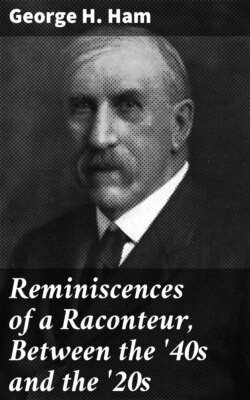Читать книгу Reminiscences of a Raconteur, Between the '40s and the '20s - George H. Ham - Страница 10
На сайте Литреса книга снята с продажи.
Put Off the First Train
ОглавлениеTable of Contents
In the fall of 1856, the town schools had a holiday, because on that day the first railway passenger train was to arrive at Whitby. The pupils were assembled up town at the High School, then called the Grammar School. The Public School pupils led the procession, preceded by the town band, and the Grammar School formed the rear of the column, under command of Mr. William McCabe, who was then the only teacher in the Grammar School. Arriving at the station, we were lined up alongside the track. About 3 p.m. a train with three passenger cars arrived from Toronto, filled with invited guests. The locomotive was decorated with flags, and on the front and sides was a piece of bunting on which was painted the words “Fortuna Sequitur.” We were ordered to make a note of these words and produce a translation thereof on the following day. We generally agreed that “Let or may fortune follow” was about the meaning of these Latin words. The train moved on to Oshawa where John Beverley Robinson and others delivered addresses.
On the return of the train from Oshawa, a number of school boys boarded the car during the stoppage at Whitby, and then occurred the first and only time I was ever put off a train. I was bound to make the trip to Toronto as I had never experienced a ride on a railway train. The conductor put my brother, four years my senior, and myself off the rear end of the car. We ran to the front end, only to be again ejected. This was a little discouraging, I will candidly admit, but we made another bolt for the front entrance, and when the irate conductor threateningly ordered us off, some of the compassionate passengers told him to give the boys a show, which he grudgingly did; and to Toronto we went. In the other cars, the invited guests protested against the invasion of the Whitby youths, but they, too, notwithstanding the threats and warnings of the conductor, stuck to the train. Neither my brother nor myself had a cent, but that didn’t worry us at all, and when we arrived in Toronto, it was after dusk. No one knew when the train would leave for Whitby, and so we had to sit in that car, hungry as bears, until good old Hugh Fraser of Whitby loomed up about ten o’clock with some crackers and cheese, after which we didn’t care a continental what old time the train would leave. Crackers and cheese are very invigorating. The other fellows pooled all the money they had and Jack Wall (afterwards Dr. John Wall of Oshawa), who had been attending college in Toronto, rustled some more crackers and cheese, which seemed to be the sole and only article of food on the menu that night. The clock struck 4 a.m. as we reached home, completely tired out but happy as clams. I was the first boy at school next morning and was the hero of the day. Rides on railways then were big events of the mightiest importance. Don’t care so much for them now. I remember that the G. T. R. car was No. 2, and a third of a century later I again rode in the same old car, then on the Caraquet Railway in New Brunswick. But as I had a pass the conductor did not dare throw me off once—let alone twice.
A hot battle was waged between Gordon Brown, of the Globe, and a member of the Grand Trunk engineering staff, as to the road and its equipment and as to its time-table for the excursion train. No one was hurt, although threats were made, and it is alleged that the Grand Trunk engineer sent a challenge to the editor of the Globe, which he did not accept or pay any attention to, except by publishing it in the Globe.
